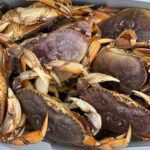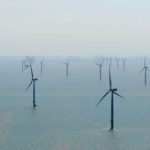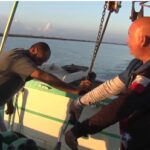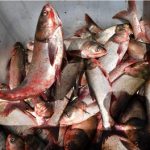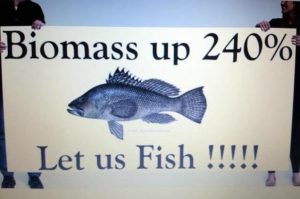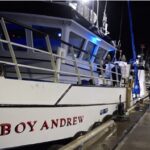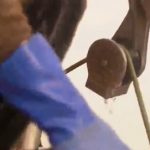Daily Archives: August 28, 2015
Video – New Study Busts Myths Around Undersize Snapper Catch
 New Zealand fishing industry leaders say an unprecedented 12 month has dispelled the myths around how many undersize snapper are being caught and returned to the sea. The new data collected by the Ministry for Primary Industries shows the commercial fishing impact on young snapper is much less than previously thought. “The myth was that our boats were returning as much as half of their catch to the sea because it was undersize. This new study has shown that’s simply not true.” Read the rest here 21:08
New Zealand fishing industry leaders say an unprecedented 12 month has dispelled the myths around how many undersize snapper are being caught and returned to the sea. The new data collected by the Ministry for Primary Industries shows the commercial fishing impact on young snapper is much less than previously thought. “The myth was that our boats were returning as much as half of their catch to the sea because it was undersize. This new study has shown that’s simply not true.” Read the rest here 21:08
Things got hot for the guy’s on the Gretchen Marie off Jeffreys Ledge – Coast Guard responds
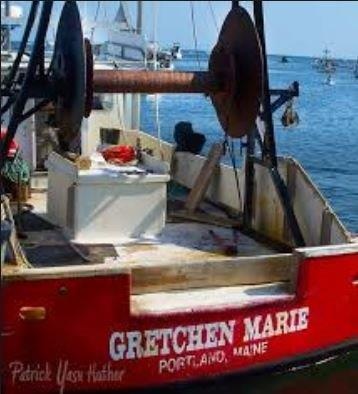 Coast Guard crews from Station South Portland, Maine, and Air Station Cape Cod responded to a report of a fishing boat fire Wednesday, about six miles from Jeffreys Ledge, a fishing area which stretches from the coast of Rockport to just southeast of Cape Elizabeth, Maine. A crewmember aboard the 40-foot fishing boat Gretchen Marie contacted watchstanders at Coast Guard Sector Northern New England at about 7:40 p.m. Wednesday reporting a fire onboard and heavy smoke in Gretchen Marie’s pilothouse. Two men were aboard the vessel. The Gretchen Marie crew had put out the engine fire with their onboard fire-fighting equipment. Read the rest here 17:28
Coast Guard crews from Station South Portland, Maine, and Air Station Cape Cod responded to a report of a fishing boat fire Wednesday, about six miles from Jeffreys Ledge, a fishing area which stretches from the coast of Rockport to just southeast of Cape Elizabeth, Maine. A crewmember aboard the 40-foot fishing boat Gretchen Marie contacted watchstanders at Coast Guard Sector Northern New England at about 7:40 p.m. Wednesday reporting a fire onboard and heavy smoke in Gretchen Marie’s pilothouse. Two men were aboard the vessel. The Gretchen Marie crew had put out the engine fire with their onboard fire-fighting equipment. Read the rest here 17:28
Can cusk survive the ‘fish bends’? So far, we have determined that they can!
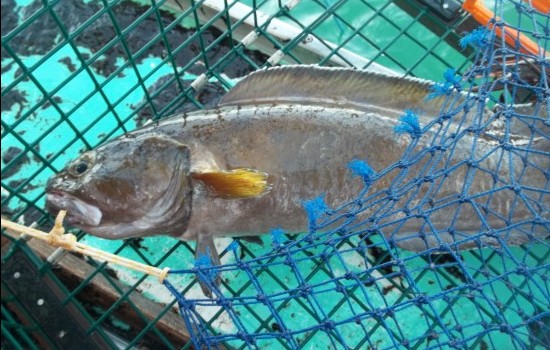 I have been working with commercial fishermen in the Maine lobster fishery to test if cusk can survive ‘the fish bend’s’So far, we have determined that cusk can survive if they are returned to the depth where they are captured. we have determined to test if cusk can survive ‘the fish bend’s’ despite all of the trauma they experience when brought to the surface. These lobstermen have been conducting experiments during normal fishing operations to collect data on the ability of cusk to survive. If a fisherman catches a cusk,,, Read the rest here 16:23
I have been working with commercial fishermen in the Maine lobster fishery to test if cusk can survive ‘the fish bend’s’So far, we have determined that cusk can survive if they are returned to the depth where they are captured. we have determined to test if cusk can survive ‘the fish bend’s’ despite all of the trauma they experience when brought to the surface. These lobstermen have been conducting experiments during normal fishing operations to collect data on the ability of cusk to survive. If a fisherman catches a cusk,,, Read the rest here 16:23
Former NOAA Meteorologist tells of years of censorship to hide the effect of “natural cycles”
David Dilley, NOAA Meteorologist, tells how for 15 years work on  was pushed while work on natural cycles was actively suppressed. Grants connecting climate change to a man-made crisis were advertised, while the word went around to heads of departments that even mentioning natural cycles would threaten the flow of government funds. Speeches about natural cycles were mysteriously canceled at the last minute with bizarre excuses. But jobs are on the line, so only retired workers can really speak, and no one can name names. Read the rest here 13:56
was pushed while work on natural cycles was actively suppressed. Grants connecting climate change to a man-made crisis were advertised, while the word went around to heads of departments that even mentioning natural cycles would threaten the flow of government funds. Speeches about natural cycles were mysteriously canceled at the last minute with bizarre excuses. But jobs are on the line, so only retired workers can really speak, and no one can name names. Read the rest here 13:56
Starkist Class Action Settlement Means Customers Get $25 In Cash Or $50 In Tuna
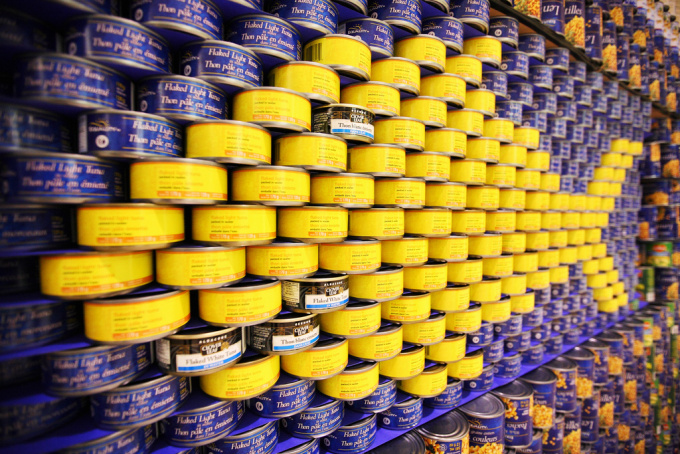 Two and a half years ago, a man who eats tuna filed a class action lawsuit against Starkist, a tuna company. His allegation was that the company was deliberately under-filling each can by a few tenths of an ounce. That might not make a difference to one consumer making one tuna salad, but would add up over millions of cans. While Starkist doesn’t admit fault, the case has been settled. If you’re a resident of the United States and bought at least one five-ounce can of any of these tunas from Starkist between February 19, 2009 and October 31, 2014, you’re eligible to file a claim: Read the rest here 13:28
Two and a half years ago, a man who eats tuna filed a class action lawsuit against Starkist, a tuna company. His allegation was that the company was deliberately under-filling each can by a few tenths of an ounce. That might not make a difference to one consumer making one tuna salad, but would add up over millions of cans. While Starkist doesn’t admit fault, the case has been settled. If you’re a resident of the United States and bought at least one five-ounce can of any of these tunas from Starkist between February 19, 2009 and October 31, 2014, you’re eligible to file a claim: Read the rest here 13:28
Domestic shrimp price drops below imports
 The typical $0.40 to $0.60 per pound premium on domestics — which had risen to $3 last year at this time — has not only completely collapsed but also reversed itself, price quotes from sources reveal. A price sheet form a major US shrimp distributor lists imported vannamei at $6.15/lb. for 16-20 per pound count, raw, peeled and deveined, tail-off product. Meanwhile, a US-based shrimp distributor is currently selling Gulf of Mexico shrimp with identical specifications at $5/lb, the distributor, speaking on condition of anonymity. Read the rest here 12:57
The typical $0.40 to $0.60 per pound premium on domestics — which had risen to $3 last year at this time — has not only completely collapsed but also reversed itself, price quotes from sources reveal. A price sheet form a major US shrimp distributor lists imported vannamei at $6.15/lb. for 16-20 per pound count, raw, peeled and deveined, tail-off product. Meanwhile, a US-based shrimp distributor is currently selling Gulf of Mexico shrimp with identical specifications at $5/lb, the distributor, speaking on condition of anonymity. Read the rest here 12:57
Pending Labor Day Ban On Harvesting Draws Grumbles From Long Island Sound Lobstermen
 The moratorium is mean to boost a lobster population that has decreased 95 percent. Darling is one of the few. He said the Long Island Sound has never recovered from a massive 1999 fish die-off, fueled by pesticide runoff and waters that have warmed several degrees since the 1970s. Lobstermen have grumbled that the new Labor Day ban, meant to allow the lobster population to recover, comes at the height of harvesting season. At the same time, environmentalists claim there is a new threat to lobsters. Read the rest here 12:13
The moratorium is mean to boost a lobster population that has decreased 95 percent. Darling is one of the few. He said the Long Island Sound has never recovered from a massive 1999 fish die-off, fueled by pesticide runoff and waters that have warmed several degrees since the 1970s. Lobstermen have grumbled that the new Labor Day ban, meant to allow the lobster population to recover, comes at the height of harvesting season. At the same time, environmentalists claim there is a new threat to lobsters. Read the rest here 12:13
New Hampshire lobstermen see no shortage of lobsters
 If lobsters are running scared from warmer southern New England waters, local lobstermen aren’t experiencing a similar shortage. According to Red Perkins, manager at Seabrook’s Yankee Fisherman’s Cooperative, lobsters are in good supply this year, although not as abundant as a few years ago.”We’re not noticing a shortage here,” Perkins said yesterday. “Last year we had a realistic lobster harvest and this year is the same as last year. A couple of years ago it was a very good year. It’s not strange for quantities to vary over the years.” Read the rest here 11:51
If lobsters are running scared from warmer southern New England waters, local lobstermen aren’t experiencing a similar shortage. According to Red Perkins, manager at Seabrook’s Yankee Fisherman’s Cooperative, lobsters are in good supply this year, although not as abundant as a few years ago.”We’re not noticing a shortage here,” Perkins said yesterday. “Last year we had a realistic lobster harvest and this year is the same as last year. A couple of years ago it was a very good year. It’s not strange for quantities to vary over the years.” Read the rest here 11:51
Kenai River Classic approach to future of fishing — Forum brings together leaders in recreational fishing industry
 Don’t let the term “recreational” mislead you, sportfishing is serious business, and panelists at the Classic Roundtable on National Recreational Fishing made the case for it to be taken more seriously in public perception and federal fisheries management. The roundtable was put on Wednesday at the Soldotna Regional Sports Complex by the Kenai River Sportfishing Association as part of its annual Kenai River Classic fundraising event. The panel consisted of various national leaders in the sportfishing community, representing Yamaha Marine, the National Marine Manufacturers Association, Center for Coastal Conservation Board of Directors, American Sportfishing Association, Alaska Oil and Gas Association, Theodore Roosevelt Conservation Partnership and the Coastal Conservation Association. Read the rest here 10:46
Don’t let the term “recreational” mislead you, sportfishing is serious business, and panelists at the Classic Roundtable on National Recreational Fishing made the case for it to be taken more seriously in public perception and federal fisheries management. The roundtable was put on Wednesday at the Soldotna Regional Sports Complex by the Kenai River Sportfishing Association as part of its annual Kenai River Classic fundraising event. The panel consisted of various national leaders in the sportfishing community, representing Yamaha Marine, the National Marine Manufacturers Association, Center for Coastal Conservation Board of Directors, American Sportfishing Association, Alaska Oil and Gas Association, Theodore Roosevelt Conservation Partnership and the Coastal Conservation Association. Read the rest here 10:46
Ocean blob brings tropical fish to B.C. coast
 Something unusual is happening off the coast of British Columbia. Fish species normally found in the warm waters of the tropics are finding their way north — and a blob is being blamed. Ian Perry, a research scientist with the Department of Fisheries and Oceans based on Vancouver Island, says butterfish, tope sharks, ocean sunfish, even a finescale triggerfish have all been spotted further north than usual. Perry says it’s not uncommon for some of these fish to find their way northward every five to 10 years, whenever there’s an El Nino, a massive patch of warm water that appears in the Equatorial Pacific every few years. Read the rest here 09:51
Something unusual is happening off the coast of British Columbia. Fish species normally found in the warm waters of the tropics are finding their way north — and a blob is being blamed. Ian Perry, a research scientist with the Department of Fisheries and Oceans based on Vancouver Island, says butterfish, tope sharks, ocean sunfish, even a finescale triggerfish have all been spotted further north than usual. Perry says it’s not uncommon for some of these fish to find their way northward every five to 10 years, whenever there’s an El Nino, a massive patch of warm water that appears in the Equatorial Pacific every few years. Read the rest here 09:51
Tribes, fishermen battle salmon-eating sea lions on the Columbia River
 Begay idled the boat and stared downriver, waiting to see if the sea lion would resurface. “We’re seeing a lot of new animals this year,” he said. “It’s like everyone brought a friend.” This year, that task was harder than ever, as unprecedented numbers of sea lions flooded into the. The influx reignited a smoldering debate: What happens when a protected marine mammal clashes with an endangered fish? Some regard sea lions as ravenous pests; others as scapegoats for the more serious problems afflicting salmon. But almost everyone agrees that they’re,,, Read the rest here 08:52
Begay idled the boat and stared downriver, waiting to see if the sea lion would resurface. “We’re seeing a lot of new animals this year,” he said. “It’s like everyone brought a friend.” This year, that task was harder than ever, as unprecedented numbers of sea lions flooded into the. The influx reignited a smoldering debate: What happens when a protected marine mammal clashes with an endangered fish? Some regard sea lions as ravenous pests; others as scapegoats for the more serious problems afflicting salmon. But almost everyone agrees that they’re,,, Read the rest here 08:52


































